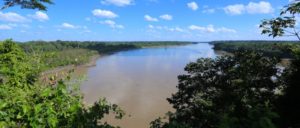
While securing a land title may be a key step for forest-dependent communities, it is not sufficient to ensure legal rights and improve livelihoods, study highlights.
Under Peruvian law, a title gives traditional forest communities rights over land, but resources on that land, such as forests, formally remain the property of the state. In order to use these resources, communities are required to follow additional procedures to obtain permits and authorizations.
This was the case faced by the indigenous community of Tres Islas in the Amazonian region of Madre de Dios – despite securing a land title more than 20 years ago, non-governmental organizations working in the region have reported that a large portion of the community’s territory is overlapped by mining permits.
Read also: Reclaiming collective rights: land and forest tenure reforms in Peru (1960-2016)
The law states that indigenous communities may be granted communal titles over agrarian lands, but rights over forests are limited to usufruct contracts – that is, the right to use, but not own, the resources found there.
Furthermore, while the government recognizes indigenous communities’ long-term-use rights over forestlands, it reserves the right to grant time-limited concessions to companies and individuals, for example for extractive activities such as timber or mining, often within the same territory. This inevitably leads to overlapping land rights and, sometimes, conflict.
In recognition of August 9 as the UN International Day of the World’s Indigenous People. The Tres Islas Community video was produced by Yoly Gutierrez and Martin Balbuena.
In 2010, the people of Tres Islas decided to build a fence to keep out miners and loggers who had been granted permits to use land under their title without the community’s authorization. Community leaders thought that they were exercising their rights when they decided to limit access by outsiders, but instead their fence was destroyed, and they were sued and incarcerated.
After years of conflict, the community took their case to the Peruvian Constitutional Court and won, establishing a legal precedent that ensures protection of indigenous territorial autonomy and requires community consultation in any case that directly affects indigenous territory.
Read also: Long road ahead to indigenous land and forest rights in Peru
“The case in Tres Islas shows the challenges that many traditional communities face across the globe, where titles or formal recognition don’t fully ensure rights, tenure security or the improvement of livelihoods,” says Iliana Monterroso, a researcher who leads the Centre for International Forestry Research’s (CIFOR) Global Comparative Study on Forest Tenure Reform in Peru.
An historical analysis performed as part of the study also shows that while governments continue to discuss reforms to simplify regulations, it is indigenous movements and non-profit organizations that have been instrumental in ensuring that communities receive technical support to comply with norms and establish a better position from which to benefit from the resources available in their forestlands.
“The findings suggest that continued support is needed to ensure that communities can develop the skills to take advantage of acquired rights. While a title or certification is very important, there are other things to consider as part of these reform processes,” Monterroso says.
By Yoly Gutierrez, originally published at CIFOR’s Forests News.
For more information on this topic, please contact Iliana Monterroso at i.monterroso@cgiar.org or Anne Larson at a.larson@cgiar.org.
This research forms part of the CGIAR Research Program on Forests, Trees and Agroforestry, which is supported by CGIAR Fund Donors.
This research was supported by the European Commission and GEF with the technical support of FAO and IFAD.











